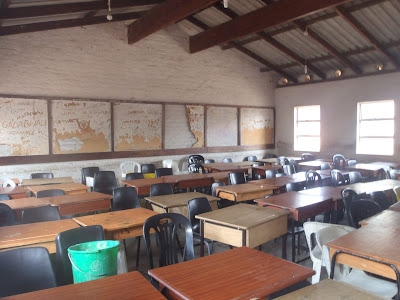On Wednesday I had the privilege of visiting Liwonde Secondary School in Southern Malawi.
 |
The school has 4 buildings as pictured above. There are 367 students at the school.
Here is the grade 12 classroom. There are 87 students in the class.
This school a major part of FAWEMA’s work given that they use it as a place to model interventions that encourage girls to stay in school. Many girls drop out of school in Malawi for a variety of reasons. Among them, there is a common belief that as soon as a girl hits puberty and grow breasts, she is ready to get married and have children. Forced marriages are a major issue for teen girls in Malawi.
 |
| The principle showing enrollment numbers |
 |
| As you can see, there are fewer girls. In forms 1 & 2 (grades 9 & 10), teenage pregnancies cause many drop-outs. |
The purpose of our visit was a FAWEMA organized award ceremony for the top performers in Math and Science subjects. They also used it as an opportunity to speak to students and the community about the importance of educating girls and to promote interventions aimed at keeping girls in school.
I happened upon the school choir preparing for their presentation at the ceremony that afternoon. I watched enchanted as they sang and danced. Below is a video clip from one of their songs. This song is about how FAWEMA promotes the education of girls.
After their presentation I clap and they run over to meet me and hang out.
  |
The school also has a ‘Speak Out’ club, where a small group of girls get together to determine ways to talk about issues commonly affecting their peers. Through refusing the cultural silence so often expected of girls and women, hopefully girls will be retained in school.
 |
| Some Speak Out! Club Members |
We also took the opportunity to ask some children about the challenges they face in school. The group we spoke with were either orphans or vulnerable children and FAWEMA supports them by paying their school fees (approximately $30 for the year). We sat outside and had any interesting conversation.
 The students told me about their favourite school subjects (most liked Math, Science and English) and their hopes for the future. Many wanted to be nurses, one a doctor, one an accountant and one a lawyer. They also told me about a typical school day for them. This is a summary of their answers:
The students told me about their favourite school subjects (most liked Math, Science and English) and their hopes for the future. Many wanted to be nurses, one a doctor, one an accountant and one a lawyer. They also told me about a typical school day for them. This is a summary of their answers:-They wake up between 3 and 5 am. They cook porridge for themselves; some walk to fetch water (up to a distance of 3 kilometers). Some study in the mornings. They go to school for 7AM.
-School ends at 2:30 after which they walk home.
 -At home, they make Nsima (Malawian staple of ground up corn and water) and then study until 6 o’clock when it gets dark. Since flashlights and lamps for gas are expensive, they can’t study after that time.
-At home, they make Nsima (Malawian staple of ground up corn and water) and then study until 6 o’clock when it gets dark. Since flashlights and lamps for gas are expensive, they can’t study after that time.-They pray and/or eat more Nsima before going to bed.
The students told us that one challenge that they don’t have the equipment that they need (exercise books, pens, pencils, lab equipment, etc).
The award ceremony was quite the event. There were many speakers and performances by students, the mother group and FAWEMA members.
The top students received a knapsack with a biology text book and a pair of shoes.
 |
| Top performers with their awards |
 |
| Mother Group members hug students who received awards |
 |
| WUSC sponsored bicycle being presented to Mother Group |
WUSC provided a bicycle in support of one Liwonde community intervention - the Mother Group. A Mother Group is a group of female community members that volunteer in schools and communities to remove barriers that cause girls to drop out. They work with teachers, local leaders and community members to sensitize them on gender issues and the importance of educating the girl child. They also ensure that there are bathroom facilities that allow for proper menstrual hygiene, support teen moms, address cases of abuse, etc. Given the long distances that Mother Group volunteers walk, bicycles are quite helpful in supporting their work.
We also gave out some awards to other girls at the school. From the Christ Church donation items, we put together small care packages that included soap, underwear, nail clippers, band-aids, facecloths, etc. We will put together more of such kits with the remaining supplies to provide to vulnerable girls at different schools. FAWEMA thinks that one benefit of these kits will be supporting attendance of girls during menstruation given that the items can be used for menstrual hygiene (many girls stay home during the week of their periods).
I finished the day by watching the girls play net ball (kind of like basketball) in gym class. They were amazing! What a day!
 |
| Life skills teacher Mrs. Ruth hands out care packages |
 |


































